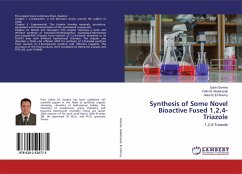The photoresponsive nature of the triazole sensors introduces a dynamic element to biomaterial sensing, enabling precise control and modulation of their response. The investigation explores the innovative application of triazole sensors with photoresponsive properties in biomaterial sensing. Combining the robust binding capabilities of the triazole scaffold with the adaptability conferred by photoresponsive units, these sensors introduce a dynamic element to sensing, enabling precise control and modulation of their response. The study showcases their versatility in various applications, from cellular imaging to biomarker monitoring, within complex biological environments. The results underscore the transformative potential of photoresponsive-based triazole sensors in advancing biomaterials sensing technologies with implications for diagnostics, drug discovery, and fundamental biological research. Overall, the investigation emphasizes their adaptability and versatility in addressing the evolving landscape of biological sensing challenges.
Hinweis: Dieser Artikel kann nur an eine deutsche Lieferadresse ausgeliefert werden.
Hinweis: Dieser Artikel kann nur an eine deutsche Lieferadresse ausgeliefert werden.








